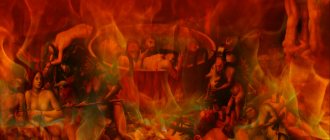What is the meaning of the biblical text “The fool said in his heart: “There is no God””?
Answer
Psalm 13:1 and 53:2 say, “The fool said in his heart, “There is no God.” Some people use these texts to try to prove that atheists are fools or madmen. However, the Hebrew word translated here as “madman” has a different meaning. In the original, the word “nabal” is used here, which more closely refers to a “moral madman,” i.e., a person without moral principles (in the translation of the Russian Bible Society, “scoundrel” is used). Thus, the meaning of this text is not that “unreasonable people do not believe in God,” but rather that “immoral people do not believe in God.”
Many atheists are very intelligent people. It is not intelligence or its absence that leads a person to reject faith in God, but a lack of morality. People don't just reject the idea that there is a Creator. They oppose the idea that there is a Creator who requires His creation to be moral. To clear their consciences and free themselves from guilt, people reject the idea of God as the only source of absolute morality. By doing this, atheists live as they please—as morally or immorally as they want—without feeling guilty about their refusal to be accountable to God.
Some prominent atheists admit this. One well-known atheist, when asked what he wanted to achieve through atheism, stated that he wanted to “drink as much alcohol and have as many women as possible.” Belief in a supreme being is accompanied by a sense of responsibility and accountability to that being. Therefore, in order to avoid the remorse of conscience, which itself was created by God, man must deny His existence in order to avoid the moral pressure of conscience.
By this we are not saying that all atheists are immoral people. Many atheists lead relatively moral lives. The essence of the expression “The fool said in his heart: “There is no God”” is that the lack of evidence of His existence is not the true reason for people to abandon faith in God. People reject it out of a desire to live free from the moral restrictions He sets and to avoid the guilt that accompanies violating those restrictions.
“The wrath of God descends from heaven against every sin and evil of people who hold the truth captive to sin. After all, they have knowledge about God... So there is no excuse for them! ... were mired in empty reasoning, and their foolish hearts were overcome by darkness. Calling themselves wise, they turned into fools... That is why God gave them into the power of uncleanness, so that, following the lust of their hearts, they would dishonor their bodies. They exchanged the truth of God for a lie” (Romans 1:18-25).
The night after which there will be no dawn
“A madman says in his heart: There is no God”Europe and America are modern civilization. Fashionable buildings, high-class cars and the most magnificent design of many, many creations of human hands - all with the latest technology and ergonomics. Humanism, tolerance and whatever “freedoms” you want - everything to satisfy any human needs (even if these “needs” are indecent for animals). But not for the benefit of the immortal human soul, which without the Lord, without fulfilling His Divine commandments, becomes the prey of death in a still living body. Therefore, the countries of the West, which were seduced into destructive heresies and rejected the God of Zhivago, are now spiritually more like the dead - rouged, dressed in everything new, covered with many flowers - just to hide the corpse stains. Beautiful scenery in a cheap theater, where both artists and spectators are miserable madmen... |
Blasphemy at all times has caused disgust among all peoples and was recognized as a great and grave sin. Our Lord Jesus Christ confirmed this immutable truth, placing blasphemy on a par with such mortal sins as fornication, murder, and theft that bring a person to hell (see: Mark 7:20-23). Blasphemy, according to the testimony of the blessed one. Theophylact of Bulgaria and other Church Fathers is an insult to the Lord Himself. What could be more deadly for the human soul?! Only mentally abnormal people who have lost the instinct of spiritual self-preservation consciously indulge in such sin. Nowadays, this sin, like many others, has already taken hold of entire nations and is becoming the “norm.” According to Interfax, the Council of Europe recently recognized the sin of blasphemy as “normal.” A terrible crime before God was declared an expression of the “free will of man”, not one of the illegal actions. For many centuries, Europe kept intact the Christian teaching brought to its land by Equal-to-the-Apostles Patrick of Ireland, Herman of Oxker, Olaf of Norway, Ansgarius of Hamburg and many other saints, becoming, in the words of St. Nicholas of Serbia, beloved daughter of Christ. But at the end of the first millennium, she became arrogant, became possessed and was seduced into heresy. Having rejected Life - the God-man Christ - Europe became a slave of death - the man-god of the pope. And now, dying and writhing in death convulsions, Europe testifies to its spiritual death through the female “priesthood”, and admiration for the abomination of Sodom, and fratricidal wars... Back at the end of the 19th century, F.M. Dostoevsky prophesied a considerable misfortune looming over Europe: “The anthill that had long been built in it, without the Church and without Christ, has been undermined. <…> Never before has Europe been filled with such elements of hostility as in our time. It’s as if everything has been dug up and filled with gunpowder, just waiting for the first spark. <…> In the West they lost Christ, and that’s why the West is falling, that’s the only reason.” The bloody 20th century fully confirmed the correctness of these words. What disasters are now being prepared for this deliberate atheist? Rev. Justin Cheliysky wrote with pain: “European humanity, led by the spirit of humanistic, vain “infallibility,” is rolling headlong from darkness to darkness, from night to night, until it plunges into a gloomy, eternal night, after which the dawn will not come...” , this prophecy is coming true today.
Victor Samartsev
LiveInternetLiveInternet
Quote from Googuenot
Read in full In your quotation book or community!
Let your life scream
“The fool said in his heart, “There is no God.” They became corrupt and committed vile deeds; there is no one who does good.”
(Psalm 13:1)
Most of us would never think that this verse applies to us. After all, we are believers! We will never say that there is no God.
But maybe we should think about it. Of course, we will never say it with our lips... but what about our actions?
We say this when we sin a little here and there, while thinking that everything is not so bad. We watch immoral movies or gossip about the pastor, completely ignoring God's commandment not to do so.
By our actions we say: “There is no God.”
Psalm 13:1 associates such things with corruption. Whether you realize it or not, the more you do this, the more depraved you become.
Don't make the foolish mistake of first publicly acknowledging Jesus as your Lord and then secretly denying Him through your actions. Be wise in everything you do so that both your heart and your life simply cry out together, “My God reigns!”
SCRIPTURE PASSAGE: Psalm 13 and 14
1 To the director of the choir. Psalm of David. The madman said in his heart: “There is no God.” They became corrupt and committed vile deeds; there is no one who does good.
2 The Lord looked down from heaven upon the sons of men, to see if there was one who understood, one who sought God.
3 All have turned aside and become equally obscene; there is no one who does good, not even one.
4 Will not all those who practice iniquity, who eat up my people as they eat bread, and do not call on the Lord, come to their senses?
5 There they will fear fear, for God is among the generation of the righteous.
6 You have laughed at the thought of the beggar, that the Lord is his hope.
7 “Who will give salvation to Israel from Zion!” When the Lord brings back the captivity of His people, then Jacob will rejoice and Israel will rejoice.
1 Psalm of David. God! who can dwell in Your habitation? who can dwell on Your holy mountain?
2 He who walks uprightly, and does righteousness, and speaks the truth in his heart;
3 whoever does not slander with his tongue, does not do harm to his own sincerity, and does not receive reproach against his neighbor
4 he in whose eyes the outcast is despised, but who glorifies those who fear the Lord; who swears, [even] to evil, and does not change;
5 who does not lend his money at interest and does not accept gifts against the innocent. He who does this will never be shaken.
From the “From Faith to Faith” newsletter.
Psalm 13
Saul and his companions have become so corrupt that the Lord does not find anyone among them “doing good” (1–8). Will these wicked people not come to their senses? The Lord will severely punish them because they laughed at the faith of the righteous in Him (4-6).
Ps.13:1. The madman said in his heart: “There is no God.” They became corrupt and committed vile deeds; there is no one who does good.
“The fool said in his heart: “There is no God.” By crazy we mean Saul. “Say in your heart” - sincerely believe, decide. Saul’s denial of God is not his denial of His existence, but his non-recognition of the Divine determination over David, according to which the latter was anointed by him to be king over Israel. Saul, in his persecution of David, was guided by his view of him as a power-hungry, a greedy seeker for the throne, and therefore a revolutionary. Saul was mistaken about David, but he was sincere in his mistake, and the courtiers around him consciously and selfishly supported such a false view in him, and therefore, in their slander against the innocent sufferer, they “committed vile deeds.”
Ps.13:2. The Lord looked down from heaven on the sons of men to see if there was anyone who understood, seeking God.
Ps.13:3. They all deviated and became equally obscene; there is no one who does good, not even one.
There were people grouped around Saul who used their influence over him for personal purposes. These ends, as well as the means for their implementation, were so unclean that there was “not one” left “to do good.” The expression is hyperbolic, indicating the degree to which all kinds of abuses and violence are widespread among the people.
Ps.13:4. Will not all the workers of iniquity, who devour my people, come to their senses ?
eat bread, and do not call on the Lord?
"They who eat up my people, like
eat bread, and those who do not call on the Lord.” David's enemies did not care about the welfare of the people, but tried to get from it for themselves everything that they consider valuable in life: they ate it like bread. They did not apply moral evaluation to their actions; they only needed what was profitable, and not what was in accordance with the Law of God: they did not call on Him and did not listen.
Ps.13:5. There they will fear fear, [where there is no fear,] for God is among the generation of the righteous.
Ps.13:6. You laughed at the thought of the beggar that the Lord is his hope.
God, who carefully watches over man (“he looked down from heaven” Ps. 13:2), will not leave them without punishment: where there is no fear for the righteous, the wicked will tremble (“they will be afraid of fear”). The final judgment of all living things belongs to God, therefore the expression “there” means before God, at His judgment, when the Lord will punish the wicked and reward only the righteous, since for the latter He is their “hope” and His favor only “in the generation of the righteous” .
Moscow Sretenskaya Theological Academy
Victor Lega 06/13/20167558
Reason allows us to explore the world around us and is an exclusive property of man, elevating him above the animal and plant world. But, exploring the mind itself, we are faced with an incomprehensible depth, which we cannot exhaust to this day. Victor Petrovich Lega will talk about what philosophical science says about the mind.
– Viktor Petrovich, tell me, how does philosophy look at the mind and its manifestations?
– The question is quite complex because it is ambiguous. On the one hand, we can say that reason is one of the most important properties in a person, as the Greek philosophers said, “dominant” (“egemonicon”). By the way, this term was also used by the Fathers of the Church, using it to mean that reason, being the main property in man, expresses the image of God (it is not for nothing that the second hypostasis of the Trinity is called Logos).
Therefore, reason rules in man, and shows that man must rule over the whole world, as well as over himself. Most of the fathers said that it is in the mind that the image of God in man is rooted.
Aristotle and Plato. Fragment of the fresco “School of Athens”. Raphael S. On the other hand, the mind can be looked at from a philosophical point of view and said that it is the ability to know the truth, the ability to reason, which can be considered as a concrete mechanism. As Socrates said: “Reason is the ability to connect concepts.” Now, by the way, this is what analytical philosophy is doing - a very powerful and popular movement, especially in Western philosophical thought. It represents the ability to analyze, to identify whether we have formed concepts correctly, whether we have connected them correctly, how to find the truth, where is its criterion, how to find delusion and error in our reasoning. This is also a very important aspect that concerns scientific thinking.
If we return to the first understanding and connect it with the second, then we will see among the Church Fathers the most respectful attitude towards reason, unless, of course, it is opposed to faith. When reason is used to refute a belief, it is a misuse of reason. And its correct use, as the Church Fathers repeatedly emphasize, leads us to God. And a person who does not use reason, as St. John of Damascus writes, becomes simply worse than an animal, because reason is a natural property of man, a gift of God, and we are obliged to use it. And animals are unreasonable and perform their own function.
Most of the fathers said that it is in the mind that the image of God in man is rooted
– The patristic teaching says that reason must dominate the sensitive and volitional powers of the soul.
Is it possible in this case to speak of reason as understanding? – The answer to this question will be ambiguous, since it concerns terminology. The Fathers of the Church use the words “reason”, “reason”, “mind”, and in the Greek language there are even more of these words: “nus”, “phronesis”, “dianoia”, “logos”, etc. And when translated into Russian this ambiguity is often lost. But, first of all, when we talk about the mind, this word means a certain holistic ability to see the truth. And in this case, the mind is almost synonymous with faith. When they say “mind,” they also mean the ability to cognize the truth holistically and without reasoning. And reason is already the analytical ability to connect concepts: reason is an instrument of reason, and reason is a property of the mind. Some fathers make such a conditional distinction between concepts. Mind is a broader concept, a particular property of which is our reason.
The Right Use of Reason Inevitably Leads to God
– Viktor Petrovich, how should we relate to the words of St. Luke of Crimea, who in his book “Spirit, Soul and Body,” referring to numerous passages of Scripture, gives an example of the fact that a person thinks with his heart?
Saint Luke of Crimea - The word “heart” is used very often in the Holy Scriptures, and many works of famous Russian philosophers, such as Panfil Daniilovich Yurkevich, Boris Petrovich Vysheslavtsev, etc., are devoted to this. And indeed, reading the Holy Scriptures, we often see that in it We are talking about the heart not as an organ for pumping blood, but as a kind of image or allegory, denoting all the powers of our soul.
Although Archbishop Luke writes about the heart as a doctor. I remember in this book he describes that as a doctor he knows that there are many nerve endings that go to the heart that play absolutely no role in the functioning of the body. Therefore, he believes that the heart is also engaged in a kind of mental activity, the brain is precisely the organ of rational activity, and the heart is mental. I don’t know, I’m not a doctor or a biologist, maybe the ruler is right, for there are many secrets and incomprehensible things in human nature. However, more often the heart is spoken of in a completely different way. Saint Gregory Palamas, for example, writes: “And I would consider our holy faith to be a kind of contemplation of our heart that surpasses any feeling and any understanding, since it surpasses all the mental abilities of our soul.” And the wonderful Russian philosopher Alexey Stepanovich Khomyakov also speaks of the heart as an integral activity of the soul, one of the properties of which is our mind, our reason. Therefore, we believe in our hearts, or even in our hearts we do not believe: “ The fool said in his heart: There is no God” (Ps. 13: 1).
This is something deeper than just mental activity.
– In ordinary consciousness, the heart is perceived by people, first of all, as a sensory organ, and then suddenly – the heart thinks
!
Tell me, how to explain such a contradiction?
– If we use Platonic language, which was often used by the Fathers of the Church, the sensual, or lustful, part of the soul is also a part of the soul, and therefore we feel with our hearts, our hearts tell us, there is a certain intuition as an extra-rational activity. Well, maybe the heart reasons, it is the only property of the soul, which includes the volitional, feeling and rational principles. And the heart can move us to action. The great French scientist and philosopher Blaise Pascal argued that we feel obvious propositions, such as axioms, with our hearts: “We know the truth not only with our minds, but also with our hearts. It is with the heart that we cognize the initial concepts, and in vain the mind, which is not involved in this, tries to challenge them.”
Saint Luke of Crimea believed that the heart also engages in a kind of mental activity
– Intuition as a specific manifestation of the human soul has been little studied scientifically.
Does philosophy say anything about intuition? –The problem of intuition in philosophy comes to the fore especially in the 20th century. Many philosophers began to pay attention to intuition. Almost simultaneously, the concept of intuition was introduced into epistemology by the Russian philosopher N.O. Lossky and the French philosopher A. Bergson. One of the early works of N.O. Lossky is called “The Justification of Intuitionism”; in general, he called his concept intuitionism. It is with the help of intuition, he wrote, that one can solve many philosophical problems of the theory of knowledge, for example those posed by Kant: the existence of the external world, the knowledge of another subject, the question of why people understand each other, etc. Although, if we reason according to Kant, we can only know ourselves - our a priori forms, only our own reason, but we understand each other, we are confident in the existence of the external world. Why? And here Lossky speaks of intuition as the basis on which our reason operates. That is, the concept of intuition is closer to the activity of the mind. A. Bergson, on the contrary, contrasts intellect with intuition: intellect cognizes only the motionless, and life can be cognized only with the help of intuition.
BUT. Lossky called intuition the basis on which our reason operates
Although, in fairness, it must be said that the concept of intuition has been used before.
For St. Augustine, for example, intuition is rather faith. He says that you cannot prove the existence of God, and you shouldn’t even try to prove it, it’s obvious, it’s intuitive. For Descartes, intuition is the evidence of truth. So the word "intuition" is used by different thinkers in different aspects. Interviewed by Andrey Golovach
Reason allows us to explore the world around us and is an exclusive property of man, elevating him above the animal and plant world. But, exploring the mind itself, we are faced with an incomprehensible depth, which we cannot exhaust to this day. Viktor Petrovich Lega about what philosophical science says about the mind.
– Viktor Petrovich, tell me, how does philosophy look at the mind and its manifestations?
– The question is quite complex because it is ambiguous. On the one hand, we can say that reason is one of the most important properties in a person, as the Greek philosophers said, “dominant” (“egemonicon”). By the way, this term was also used by the Fathers of the Church, using it to mean that reason, being the main property in man, expresses the image of God (it is not for nothing that the second hypostasis of the Trinity is called Logos).
Therefore, reason rules in man, and shows that man must rule over the whole world, as well as over himself. Most of the fathers said that it is in the mind that the image of God in man is rooted.
On the other hand, one can look at the mind from a philosophical point of view and say that it is the ability to know truth, the ability to reason, which can be considered as a concrete mechanism. As Socrates said: “Reason is the ability to connect concepts.” Now, by the way, this is what analytical philosophy is doing - a very powerful and popular movement, especially in Western philosophical thought. It represents the ability to analyze, to identify whether we have formed concepts correctly, whether we have connected them correctly, how to find the truth, where is its criterion, how to find delusion and error in our reasoning. This is also a very important aspect that concerns scientific thinking.
If we return to the first understanding and connect it with the second, then we will see among the Church Fathers the most respectful attitude towards reason, unless, of course, it is opposed to faith. When reason is used to refute a belief, it is a misuse of reason. And its correct use, as the Church Fathers repeatedly emphasize, leads us to God. And a person who does not use reason, as St. John of Damascus writes, becomes simply worse than an animal, because reason is a natural property of man, a gift of God, and we are obliged to use it. And animals are unreasonable and perform their own function.
Most of the fathers said that it is in the mind that the image of God in man is rooted
– The patristic teaching says that reason must dominate the sensitive and volitional powers of the soul.
Is it possible in this case to speak of reason as understanding? – The answer to this question will be ambiguous, since it concerns terminology. The Fathers of the Church use the words “reason”, “reason”, “mind”, and in the Greek language there are even more of these words: “nus”, “phronesis”, “dianoia”, “logos”, etc. And when translated into Russian this ambiguity is often lost. But, first of all, when we talk about the mind, this word means a certain holistic ability to see the truth. And in this case, the mind is almost synonymous with faith. When they say “mind,” they also mean the ability to cognize the truth holistically and without reasoning. And reason is already the analytical ability to connect concepts: reason is an instrument of reason, and reason is a property of the mind. Some fathers make such a conditional distinction between concepts. Mind is a broader concept, a particular property of which is our reason.
The Right Use of Reason Inevitably Leads to God
– Viktor Petrovich, how should we relate to the words of St. Luke of Crimea, who in his book “Spirit, Soul and Body,” referring to numerous passages of Scripture, gives an example of the fact that a person thinks with his heart?
Saint Luke of Crimea
– The word “heart” is used very often in the Holy Scriptures, and many works of famous Russian philosophers, such as Panfil Daniilovich Yurkevich, Boris Petrovich Vysheslavtsev, etc., are devoted to this. And indeed, when reading the Holy Scriptures, we often see that it talks about the heart not as an organ for pumping blood, but as a kind of image or allegory, denoting all the powers of our soul. Although Archbishop Luke writes about the heart as a doctor. I remember in this book he describes that as a doctor he knows that there are many nerve endings that go to the heart that play absolutely no role in the functioning of the body. Therefore, he believes that the heart is also engaged in a kind of mental activity, the brain is precisely the organ of rational activity, and the heart is mental. I don’t know, I’m not a doctor or a biologist, maybe the ruler is right, for there are many secrets and incomprehensible things in human nature. However, more often the heart is spoken of in a completely different way. Saint Gregory Palamas, for example, writes: “And I would consider our holy faith to be a kind of contemplation of our heart that surpasses any feeling and any understanding, since it surpasses all the mental abilities of our soul.” And the wonderful Russian philosopher Alexey Stepanovich Khomyakov also speaks of the heart as an integral activity of the soul, one of the properties of which is our mind, our reason. Therefore, we believe with our hearts, or even with our hearts we do not believe: “The fool said in his heart: There is no God” (Ps. 13: 1). This is something deeper than just rational activity.
– In ordinary consciousness, the heart is perceived by people, first of all, as a sensory organ, and then suddenly – the heart thinks! Tell me, how to explain such a contradiction?
– If we use Platonic language, which was often used by the Fathers of the Church, the sensual, or lustful, part of the soul is also a part of the soul, and therefore we feel with our hearts, our hearts tell us, there is a certain intuition as an extra-rational activity. Well, maybe the heart reasons, it is the only property of the soul, which includes the volitional, feeling and rational principles. And the heart can move us to action. The great French scientist and philosopher Blaise Pascal argued that we feel obvious propositions, such as axioms, with our hearts: “We know the truth not only with our minds, but also with our hearts. It is with the heart that we cognize the initial concepts, and in vain the mind, which is not involved in this, tries to challenge them.”
Saint Luke of Crimea believed that the heart also engages in a kind of mental activity
– Intuition as a specific manifestation of the human soul has been little studied scientifically.
Does philosophy say anything about intuition? –The problem of intuition in philosophy comes to the fore especially in the 20th century. Many philosophers began to pay attention to intuition. Almost simultaneously, the concept of intuition was introduced into epistemology by the Russian philosopher N.O. Lossky and the French philosopher A. Bergson. One of the early works of N.O. Lossky is called “The Justification of Intuitionism”; in general, he called his concept intuitionism. It is with the help of intuition, he wrote, that one can solve many philosophical problems of the theory of knowledge, for example those posed by Kant: the existence of the external world, the knowledge of another subject, the question of why people understand each other, etc. Although, if we reason according to Kant, we can only know ourselves - our a priori forms, only our own reason, but we understand each other, we are confident in the existence of the external world. Why? And here Lossky speaks of intuition as the basis on which our reason operates. That is, the concept of intuition is closer to the activity of the mind. A. Bergson, on the contrary, contrasts intellect with intuition: intellect cognizes only the motionless, and life can be cognized only with the help of intuition.
BUT. Lossky called intuition the basis on which our reason operates
Although, in fairness, it must be said that the concept of intuition has been used before.
For St. Augustine, for example, intuition is rather faith. He says that you cannot prove the existence of God, and you shouldn’t even try to prove it, it’s obvious, it’s intuitive. For Descartes, intuition is the evidence of truth. So the word "intuition" is used by different thinkers in different aspects. Interviewed by Andrey Golovach
Sdsmp.ru
Orthodox stories
What the famous atheists Nietzsche and M. Monroe, Lenin and Voltaire said before their death... What the engineer who built the Titanic “joked” about and what the pop idol was sure of. music Lennon...
FRIEDRICH NIETZSCHE: Lost my mind. Died barking in an iron cage
VOLTER is a great mocker. He had a terrible end. He shouted for mercy all night. His nurse said: “For all the money in Europe, I would not want to see a death like Voltaire’s - the death of an unbeliever.”
DAVID HUME is an atheist. Before his death he constantly shouted: “I am in flames!” His despair was terrible...
NAPOLEON is the emperor. His attending physician wrote: “The emperor died alone, abandoned by everyone. His dying struggle was terrible...”
CHARLES IX: “I am lost. I am clearly aware of this."
HOBBS - English philosopher: “I stand before a terrible leap into darkness.”
WOLFGANG GOETHE: “More light!”
LENIN: He died with his mind darkened. He asked the table and chairs for forgiveness for his sins... How strange this is for a man who was a leader and ideal for millions of people...
YAGODA - head of the Soviet secret police: “There must be a God. He is punishing me for my sins."
ZINOVIEV - Lenin's comrade-in-arms, executed by order of Stalin. “Listen, Israel, the Lord our God is one God,” these are the last words of one of the leaders of the atheistic state.
WINSTON CHURCHILL - English Prime Minister during World War II: “What a madman I am!”
YAROSLAVSKY - President of the atheist international movement: “Please, burn all my books. Look at the Saint! He has been waiting for me for a long time. He is here!"
1 JOHN LENNON: at the peak of his fame (in 1966), during an interview with a leading American magazine, he said: “Christianity will soon end, it will simply disappear, I don’t even want to argue about it. I'm just sure of it. Jesus was OK, but his ideas were too simple. Today we are more famous than HE! After he declared that the Beatles were more famous than Jesus Christ, he died tragically. One psychopath shot him six times at point-blank range. It is noteworthy that the killer did this in order to take away his popularity and become famous throughout the world as the killer of the famous singer.
2. Brazilian politician Tancredo de Ameido Neves: during his presidential election campaign he publicly said: “If I get 500,000 votes for my party, then even God himself will not be able to remove me from the presidency!” Of course, he gained these votes, but suddenly fell ill and died suddenly one day before becoming president.
3. Brazilian composer, singer, poet: during a show in Rio de Janeiro, taking a drag from a cigarette, noisily blew smoke into the air and blasphemously proclaimed: “God, this is for you!” He quickly died at the age of 32 from AIDS.
4. The engineer who built the Titanic: after completing construction work, when asked by reporters how safe his miracle ship would be, he answered with irony in his voice: “Now even God cannot sink it!” Surely everyone knows what happened to the unsinkable Titanic.
5. The famous actress Marilyn Monroe: during the presentation of her show, evangelist Billy Graham visited. He said that the Spirit of God sent him to preach to her. After listening to the preacher, she replied: “I don’t need your Jesus!” Just a week later she was found dead in her apartment.
6. In 2005, in the city of Campinas, Brazil: a group of drunken friends came to pick up their friend from home for further entertainment. This girl’s mother, very worried about them, walked her to the car and, holding her daughter by the hand, said with trepidation: “My daughter, go with God, and may He protect you,” to which she boldly replied: “In our car already there is no room for Him, unless He climbs in and rides in the trunk...” A few hours later, the mother was informed that this car had been in a terrible car accident and everyone had died! The car itself was mutilated beyond recognition, but the police reported that, despite the fact that the entire car was completely destroyed so that it was impossible to even recognize its make, the trunk remained completely undamaged, which is completely contrary to common sense. Imagine everyone’s surprise when the trunk easily opened and a tray of eggs was found in it, and not a single one of them broke or even cracked!
7. Jamaican journalist and dancer Christina Hewitt: said: “The Bible is the worst book ever written!” Soon, in June 2006, she was found burned beyond recognition in her own car.
No One Has Comfortably Entered the Kingdom of God
The author of a recently published collection of conversations entitled “The Open Heart of the Church,” which quickly gained popularity among the believers of our country, Metropolitan Athanasius (Nicolaou) of Limassol, in the published translation, raises the topic of death and touches on an important question for every Christian: how to live in such a way as to inherit the Kingdom of God?
“Instead of telling you: “If the Lord wills and we live, we will do this or that,” you, in your arrogance, become vain: all such vanity is evil.”[1]
This arrogance is like madness. The Gospel calls two people crazy. “The madman said in his heart: “There is no God,”[2] says the Holy Father. Scripture. Anyone who does not believe in God is a madman. The second madman is a rich man who said: “I will tear down my barns and build larger ones, and I will gather there all my grain and all my goods, and I will say to my soul: soul, you have a lot of goods laid up for many years: rest, eat, drink. , have some fun. But God said to him: crazy! this night your soul will be taken from you; who will get what you have prepared?”[3]
Both people suffer from the same disease - atheism. Instead of believing in God, they believe in something else: mammon, wealth, strength, health, etc. God called this man a madman because he did not want to be near Him, and you don’t have to be a Christian and read the works of St. fathers and the Gospel to understand this. This is a matter of common sense. Ask anyone you want whose mind is working correctly: do you know what will happen tomorrow? There are so many deaths happening every day. I read how many people die every second, time corrupts us, every minute that passes takes away a part of our life. So the matter of common sense to understand this and do more spiritual things is a matter of grace. However, to understand what we are talking about now, logic is required. Why does God call a person crazy, crazy, who does not understand that it is impossible to behave in this way? Why are you doing this, are you immortal? And will you correct the whole world, you say and think that you will conquer the world? And where will you go? From this point of view, death is truly a benefit that interrupts precisely this arrogance, this self-praise of a person, so that evil does not become immortal. Death entered our lives so that evil would not become immortal, and this is how this madness of man is interrupted.
Even though we know that we will die, we do so many crazy things. Imagine if we knew we wouldn't die. What would happen then? Who would talk some sense into us? Nobody could do this. Of course, if a person does not think that all this is outside of Christ, he may despair, that is, the thought of death is such a valuable and important event that it is the basis of spiritual life. But endurance is necessary, because death is our nature and the enemy of our existence, but only in Christ we overcome it, because behind it we see Christ and do not remain in it. I do not stop at the door because death is the door through which I enter, because I know that Christ is behind the door and I open the door with joy. At the same time, if I lose Christ who is behind the door, then entering through that door will be very painful for me. A person should always have Christ next to him. Especially when he struggles with despair and sees that his life is ending, that he is getting old, sick, or he is overcome by the thought: “What will happen? We're going to die this moment! What's happening to us? Yes, all this is really undesirable, but it also becomes beautiful when we place Christ in it. Then death becomes for us a transition from present to eternal things. From corruptible to imperishable things, from this world to eternal life with the Lord.
Imagine if someone now tells us:
- In one minute you will die!
If I believe that I will now see Christ, Whom, although as little as I can, I have loved in my life, sought Him and strived for Him, then I will truly feel at peace, and this will help me overcome this problem. But if we desire otherwise, our heart will feel sorrow and we will have problems. Therefore, it is necessary to maintain the constant presence of Christ next to you. Only in this way can we ignore the perishable things of man. You go to the mirror and see that you have grown, grown old, you are not the same as you were before, look at old photographs and say to yourself: “What was I like, and what am I now? I am so old, my life is ending, how quickly the years have flown by! Life is like steam."
So we resist the presence of Christ. Christ is our life and we seek Him. Or does a person sit and think about all of humanity: how many people do I know who lived in this world and knew my ancestors? My great-grandmother, great-great-grandmother? No one. And they were people like us, with their dreams, children, grandchildren, work, dreams, they lived their lives, they lived in this world, their lives ended, our lives will also end, in 100 years, if the world continues to exist, then no one will remember us. The only one who will remember us if we are united with Him is God. That’s why in the Church we say: “Eternal memory!” Unfortunately, some absurd words are said at the funeral, and you start to get angry. What words do we not listen to? Sometimes I turn off the microphone beforehand because I'm tempted to get angry, so I mutter to myself to avoid saying into the microphone:
- Unforgettable friend, we will always remember you!
Listen, will you really live forever to remember him? How many more years will you live? Unhappy man, who will forever remember whom? If you die soon, like him, and someone else, and me? Who will remember you, and who will remember the other person? Eternal memory means that God will forever remember you, and God remembers those who loved Him and sought Him in their lives. This is how we pray for a deceased brother. Yes, and we will forget you after others forget us, and we leave this world, but we pray for you that God will always remember you! This means “eternal memory” - eternal memory with God.
We say this in Church, we remember the departed at the Holy Liturgy, we remember them, of course, and God remembers them, He does not forget anyone, He remembers everyone, but when we say that God remembers you, it means that God will give you His mercy and grace, if, naturally, you loved Him and sought Him. Therefore, a believer is not under threat of oblivion, but remains in God’s memory, and God remembers him. Thus, we have peace in our hearts and walk our life’s path with calmness. Yes, this is a mortal path, no matter how you look at it, and no matter how many trees we knock on (as they say, knock on wood)! Okay, knock on wood as much as you want! This fate will not escape you.
It is God's presence that gives us hope in life. We do everything, we strive, we live for today, today, give us our daily bread this day! Live today in a godly manner, as beautifully, better, more joyfully, more blessedly as possible with God’s help. Leave tomorrow, it does not belong to us, but belongs to God, and also yesterday, it has passed and that’s it. Look at today. “If the Lord willing and we live, we will do this and that.”
So say: “With God’s help, if God willing, I will do this and that.” Do you know what hope this gives to our hearts? Firstly, it relieves us of the stress that eats away at us, that we absolutely must do certain things, and woe to us if we don’t do them! But do what you can, something human, if it works, good, if it doesn’t work, that’s also good. The world will not perish, nothing significant has happened. Don't get attached to these things, they are passing, temporary, and don't waste your time on vanity. If you can do something specific, do it. You did it? Thank God that you did this, so that you can be glad that you did something good and useful for you and your family. You didn't do it? Couldn't do it? Blessed be! Leave it in God's hands. Complete trust in God relieves us of the stress that is eating away at even small children who have stress. Will God be pleased with this? Put that question mark. But we often say: No! This must be done at any cost! Well, how do we know that this is going to happen? Why should this happen? And if everything happened, what do we want? You know, our life is so changeable and not everything always depends on us, because if a person strives for everything to happen the way he wants, he can easily destroy his life. Well, some things happen the way we want, but others don’t. Then why do we destroy our lives with such zeal? Accept the present reality, accept things as they are.
One day, I was reading some newspaper to find out what was happening in the world. There was an article about the funeral of a 70-year-old woman, the mother of her son who disappeared without a trace. I said to myself: “Look, the life of a mother who lost her child has ended. He's gone missing." Her life was spent in suffering. Think about what it means to lose a child and not know whether he is alive or not, or whether he will be found or not. If you know that he died, you cry, you bury him, you accept reality as it is, but being missing is the biggest pain. Of course, this brought enormous suffering to this woman, her life was difficult - not knowing what happened to your child for 30 years. Since 1974, Northern Cyprus has been under Turkish occupation. During the invasion of Turkish troops, many people disappeared without a trace. But now her life is over, all her torment is over. Now, after leaving this world, all her pain in the Eternal Kingdom of God is like a treasure, as if she had collected precious treasure. As Elder Paisios says, “when we die, the first thing we will do, as soon as we open our eyes in the Kingdom of God - we will see with our own eyes the reality, the essence of things, and not the way we see them here - we will thank God for all the sorrows in our life". We will not say to God: “Oh my God, thank you! How good it is that I lived my life! Had children, wealth, good job! Oh, I lived my life wonderfully!” No! A person will not remember this, but sorrows, temptations, difficulties are what helped him collect heavenly treasure. All good things, which are also blessed by God, will not prepare crowns for us. We will not have a crown from God because we have lived a good life.
Remember what God said to the rich man: “Child! Remember that you have already received your good in your life, but Lazarus received your evil; now he is consoled here, and you suffer.”[4]. Do not complain. He lived, he was abandoned, tormented, but you felt good, you didn’t experience any problems, you didn’t know pain and sorrow.
Therefore St. fathers do not praise a sorrowless life. We are not masochists to torture ourselves. But they are not talking about this, but about the fact that in life, whether we like it or not, we are forced to drink many bitter cups. And even if I don’t experience anything more painful, our corruption is already a bitter cup, our corruptible and sick “I” going towards death is a bitter cup for us. So, if a person lives his sorrows correctly, they are truly translated into eternal life. And then in the Kingdom of God you see how these difficulties turned into treasure. Just like someone who lives very poorly suddenly finds himself with a huge amount of money, such a person will not even pay attention to the small deprivations to which he was subjected.
It is important to say: “If God wills!”, but not because we shift responsibility for our work to God, and not because God deprives us of our freedom, or takes it away from ourselves. We calmly place our lives in God’s hands and thus achieve peace, get away from our stress and from the words: “I want this! I don't want it! I will do it! I won't bear it if it happens otherwise! I'll do it!" All these big words are like a soap bubble, all human things are transitory, only God abides forever. A person who believes in God has a sense of eternity and peace in his heart, does not get embarrassed, does not panic, does not get upset because something did not happen as he planned, but accepts it and thanks God.
We sing about the deceased at the funeral service: “come to give the last kiss to the deceased, thanking God,” that is, let us thank God, let us not grumble. Why? Why is this our path: our brother died, today he is, tomorrow another, one after another, like planes at the airport, taking off every two minutes. The next plane arrives, then the next plane, and eventually our plane will arrive! It’s like a dispatcher starts talking through a megaphone at an airport:
– Passengers flying to Larnaca, go to gate no. 5, passengers flying to heaven, go to gate no. 0!
Like this. You go inside and fly away...
* * *
“No one has entered the Kingdom of God comfortably,” says Isaac the Syrian, that is, jumping up and shouting: “Tra-la-la!” In fact, these words indicate that the saints joyfully died as martyrs. Yes, they rejoiced, but before that they had reached the extreme limit of their endurance in the test and it was there that they met God. A person goes through this state once in his life; it is unlikely that this can be achieved a second time. Once he reaches the extreme limit of his strength. This may be the hour of his death, it may be at some other moment - we do not know, but when he reaches this, a person is truly broken with pain. However, this is the whole secret: God strengthens a person in difficult times, and it may be one minute, one day, one year, but God holds a person by one thread, which is called faith. One day, Pope Ephraim Katunakiotis told us that he experienced approaching death, that is, he anticipated it: he plunged into such despair, and he was in this hell for 6-7 minutes, but these minutes were eternity for him. However, God saved him, and he heard in his soul what Christ says in the Gospel: “I am coming to you.” The darkness immediately disappeared, his heart came to life, God drove away the darkness. Who destroys the darkness of death? This is Christ. Death comes and says: “Now I will swallow you! I’ll tear it apart!” But put Christ before you and everything will change immediately.
Therefore, the saints joyfully went to torture - they were eaten by lions... Who is not afraid of a lion, an executioner with a sword? But even small children went for it - they did not look at the lion or the executioner, but at Christ, who was behind the lion or the executioner, and were not afraid. Every person, when he is in trouble, must put Christ as a counterbalance. Then, just as in the Old Testament, Moses made bitter water sweet, and the bitter water of temptation will be sweetened if you put Christ in it, if you remember Him and put Him before you.
Also, not a single saint believed in himself. On the contrary, the more holiness they achieved, the more desperate they felt. Do you know what saved them? Trust in God. They said: “Yes, I am nothing, I have done nothing, I have nothing!”
Papa Ephraim said: “I want to find something good in myself, but I don’t find anything!”
How many years has he been in the desert? Hesychast, with accumulated vast experience from God. What will save us? Trust in the mercy of God, that is, in God and His great mercy, and not in our works![5]
Translation from Bulgarian – Master of Theology Vitaly Chebotar.








